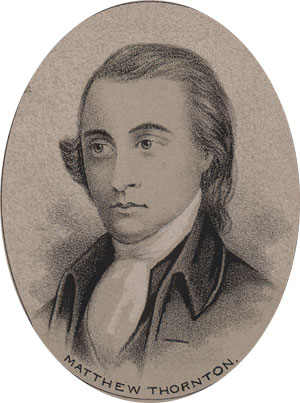Matthew Thornton was born in 1714 to James Thornton, a native of Ireland. When Matthew was two years old, his father emigrated to America. After a few years, he moved to Worchester, Massachusetts.
He received an excellent secondary education. Then he pursued medical studies. After completing his courses, he moved to Londonderry, New Hampshire, where he began his medical practice. He became a distinguished physician and a surgeon.
Matthew Thornton, Physician
In 1745, Governor Shirley raised five hundred men from New Hampshire to attack Cape Breton. Dr. Thornton went with the troops as a surgeon.
On the first of May, Colonel William Pepperell surrounded the city of Louisburg. He sent one column around the city to distract the French at night. The rest of the army burned the ammunition store. The smoke of the fire terrified the French that they retired into the city.
The next morning, Colonel Vaughan and thirteen men discovered that the French deserted the battery. He hired a Cape Cod Indian to crawl into an opening and open the gate. After he took possession, he sent a dispatch to his general, requesting reinforcements.
When the French learned that Vaughan captured the battery, they sent a hundred men to retake it. Colonel Vaughan defended the battery until reinforcements arrived. The town of Louisburg fell soon afterward.
During this engagement, Dr. Thornton only lost six men to illness. The British governor rewarded Dr. Thornton with Justice of the Peace and commissioned him as Colonel of the royal militia.
William Thornton, Patriot
When the crisis of independence arose, Dr. Thornton sided with the colonists. The royal governor fled New Hampshire. Dr. Thornton then served as president of a provincial convention in Exeter.
As president of the convention, Dr. Thornton encouraged the delegates to take up arms against British cruelty. He also urged them to promote Christian unity to ensure their prospect of success.
“In a word, we seriously and earnestly recommend the practice of that pure and undefiled religion, which embalmed the memory of our pious ancestors, as that alone upon which we can build a solid hope and confidence in the Divine protection and favor, without whose blessing all the measures of safety we have, or can propose, will end in our shame and disappointment.”
The next year Dr. Thornton was a delegate to the Continental Congress and took his seat on the fourth of November. Although he was not present when Congress published the Declaration of Independence, Congress allowed him to sign the document. This was also true of Benjamin Rush, George Clymer, James Wilson, George Ross, and George Taylor.
Dr. Thornton served New Hampshire in various roles. He served a term as a judge and state senator. He was also active in local politics.
Matthew Thornton, Gentleman
Many admired several of Dr. Thornton’s qualities. Firstly, he was an intellectual with quick insight. Secondly, he was very likable. Children and youth loved his stories and sense of humor. He had a gift as a storyteller and an infectious laugh. Thirdly, he confessed to being a bit greedy at times. However, he paid his debts promptly.
As a physician, he often exposed himself to whooping cough. Yet, he never suffered from it in all his years in medical practice until he was 82. Although he recovered, he became feebler. Nevertheless, he continued his medical practice.
Dr. Thornton died in 1803 at the age of 89. The eulogy by the Reverend Dr. Burnap summarized his life well.
“He was venerable for his age, and skill in his profession, and for the several significant and honorable offices he had sustained; noted for the knowledge he had acquired, and his quick penetration into matters of abstruse speculation; exemplary for his regard for the public institutions of religion, and for his constancy in attending the public worship, where he trod the courts of the house of God, with steps tottering with age arid infirmity. Such is a brief outline of one who was honored in his day and generation, whose virtues were a model for imitation, and while memory does her office, will be had in grateful recollection.”
